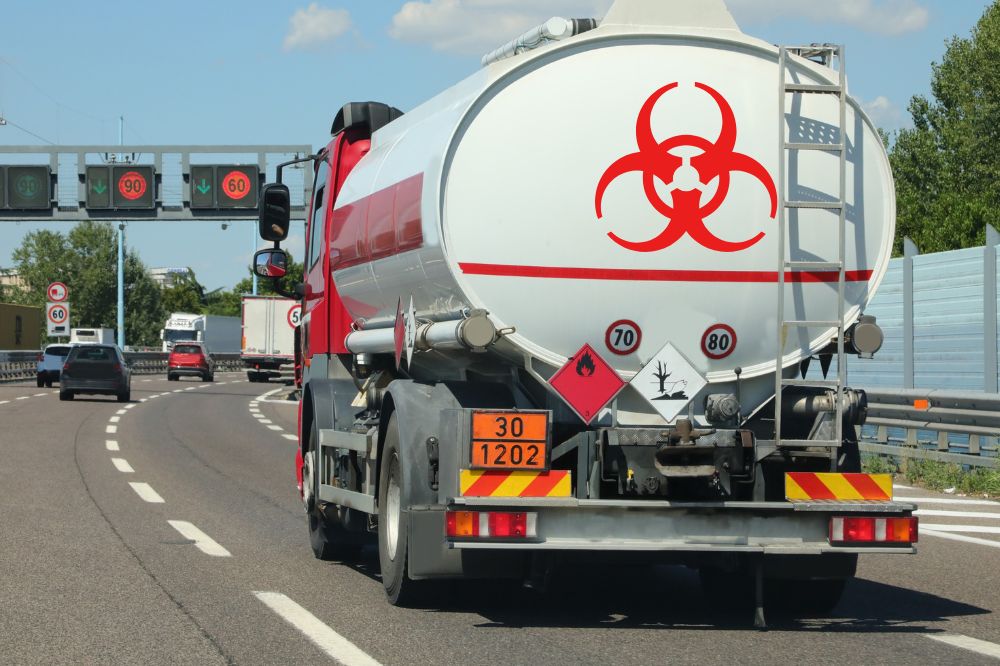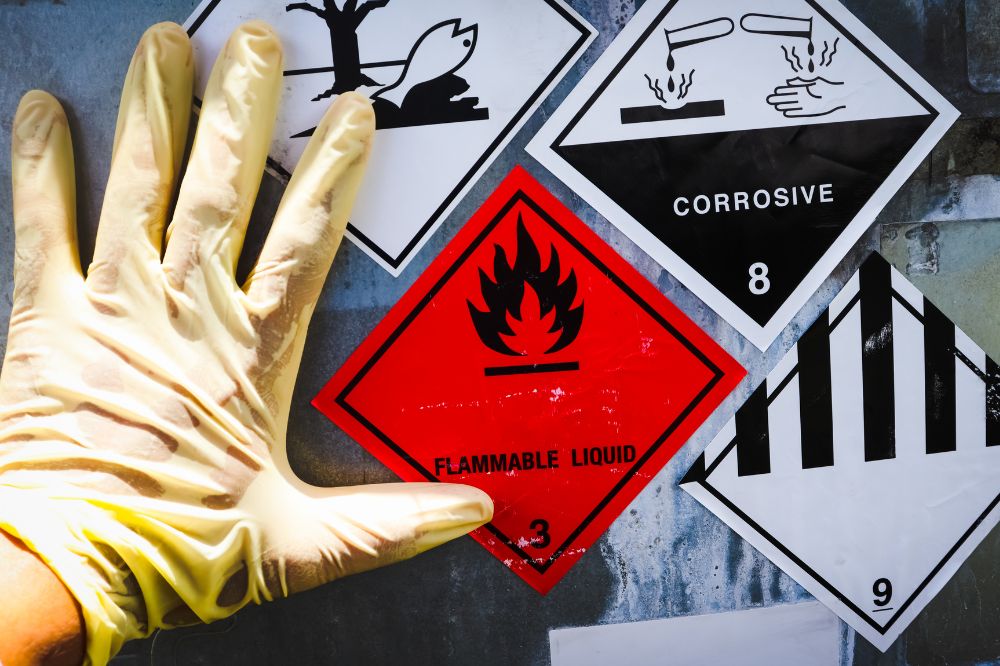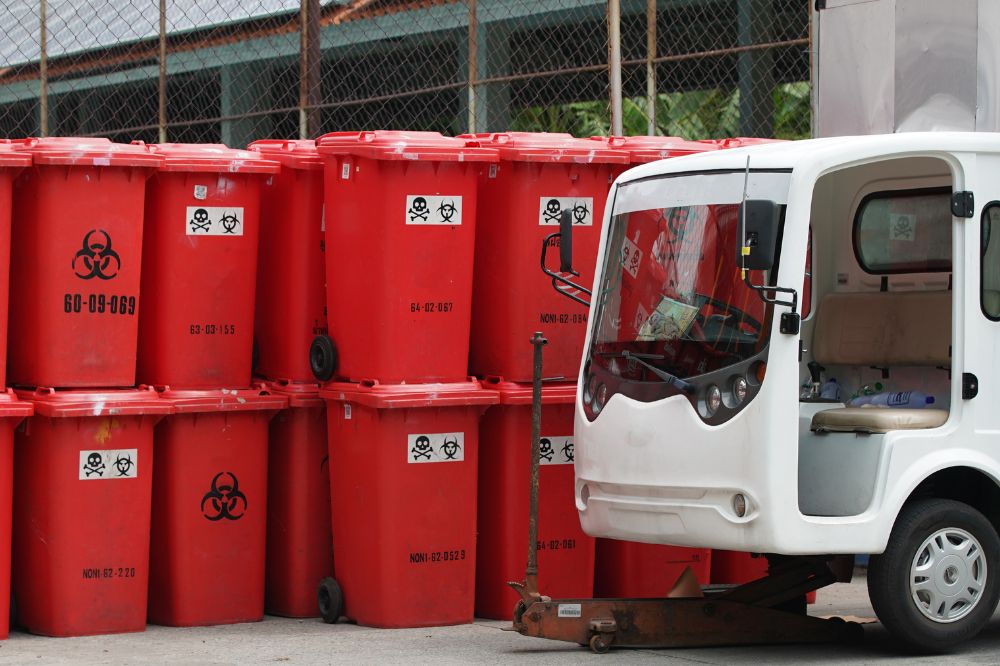
Hauling hazardous materials is one of the most profitable commercial trucking ventures. It’s also the riskiest as it threatens public safety.
To minimize risks and promote public safety, the federal government imposes several restrictions on hazardous materials hauling. You cannot, for instance, conduct your hazmat trucking operations without purchasing a hazmat truck insurance policy with specific coverages.
Below, we discuss all you need to know about hazmat trucking insurance: What is it, and what coverage options do you need for your hazmat commercial trucking business to succeed?
What is Hazmat Truck Insurance?
Hazmat truck insurance protects companies transporting hazardous materials from both general trucking risks and specific hazards associated with handling dangerous substances.
These policies tend to be pricier due to safety concerns, but they offer similar benefits to regular commercial trucking insurance. This coverage ensures financial protection in case of accidents, covering losses and legal fees associated with settlements.
Who Needs Hazmat Truck Insurance?
State and federal laws require all businesses that haul hazardous materials to purchase hazmat trucking insurance.
Hazardous material includes anything that threatens human safety, is explosive, flammable, or poisonous. Several materials fit these criteria of harmful substances and are, thus, labeled hazardous or extra hazardous, depending on how dangerous they are.
This includes business owners who operate hazardous waste transporters. These include entities or individuals who transport waste from their source to a different destination, say a recycling, treatment, storage, or disposal facility.

What Cargo is Classified as Hazardous Materials?
According to the Federal Motor Carrier Safety Administration (FMCSA), all the examples of hazardous materials we’ve mentioned fall under nine classes of hazardous cargo:
Class 1 – Explosives
Class 2 – Gasses
Class 3 – Flammable liquid
Class 4 – Flammable solid
Class 5 – Oxidizing substances, e.g., organic peroxides
Class 6 – Poisonous (toxic) or infectious substances
Class 7 – Radioactive materials
Class 8 – Corrosives
Class 9 – Miscellaneous dangerous goods, like marine pollutants
Different classes of hazardous materials require varying amounts of liability coverage. Some, like the poisonous and radioactive classes, are difficult to insure unless you work with a knowledgeable and experienced hazmat truck insurance company.
What Coverage is Offered by Hazmat Insurance Carriers?
Hazmat truck insurance companies offer several insurance coverages.
Collision and Comprehensive
Collision and comprehensive hazmat trucking insurance protects your trucks and trailers from damages resulting from theft, vandalism, overturn, upset, fire, bad weather, and accidents with animals.
Pollution Liability
Pollution liability coverage covers cleanup expenses if pollutants spill in transit or during loading and unloading. This coverage also pays for damages that may occur due to the spill.
Hazmat General Liability
Liability insurance covers incidents specific to the trucker’s actions and other non-trucking-related claims. These may include wrongful delivery of liquids. It’s worth noting that this type of hazmat truck insurance is usually a requirement for most hazardous materials trucking contracts.

Liability Insurance
Liability insurance is mandatory (required by law) for all hazmat haulers. It pays for third-party bodily injury and property damages when your covered auto causes an accident.
On average, FMCSA requires you to purchase a $1,000,000 minimum liability coverage, but this depends on the hazardous materials hauled. Some hazardous cargo require a minimum of $5,000,000 liability insurance to transport.
Excess Liability
Excess liability coverage provides additional protection against settlement claims that may exceed your insurance liability limits, up to $50,000,000.
Loading and Unloading
Loading and unloading protects hazardous cargo when being loaded or unloaded.
Medical Payments and PIP
Medical payments and personal injury protection (PIP) covers medical payments for any injuries your driver and other passengers in your car may incur in an accident, regardless of fault.
GAP Insurance
Hazmat truck and trailer values can depreciate faster than their financed value. Add-on GAP coverage protects you if your truck is stolen or totaled, covering the difference between compensation and your loan or lease balance.
Downtime Coverage
Downtime coverage helps you manage your truck payments and other essential bills if a covered loss pushes you out of business for an extended period.
Rental Reimbursement
Hazmat truck rental reimbursement coverage allows you to rent another truck and continue working if an accident puts your vehicle out of operation. It covers a chunk of the rental cost to help you remain profitable while waiting for your truck to get repaired.

Requirements for Hazmat Commercial Truck Insurance
The minimum insurance filing requirements for hazmat trucks depend on the types of hazardous materials hauled.
Trucks transporting oil and hazardous waste require a minimum of $1,000,000 liability coverage. Trucks transporting gases, explosives, radioactive materials, or anything poisonous if inhaled require significantly higher coverage limits of $5,000,000 minimum.
Haulers of hazardous cargo must comply with several safety-sensitive requirements outlined by FMCSA, including:
- Maintaining proper placards
- Keeping their commercial driver’s license (CDL) endorsements up-to-date
- Purchasing required safety permits and following all applicable regulations for hazardous trucking.
Considerations When Choosing a Hazmat Trucking Insurance Carrier
When looking for a hazmat trucking insurance carrier, settle for a leading provider with both expertise in commercial trucking insurance and knowledge about the unique risks of hazmat trucking.
To identify the best hazmat truck insurance company, shop around for one that offers:
- Competitive rates and discounts
- Help comply with all safety regulations
- 24/7 access to your insurance certificate
- Pre-employment Screening Reports (PSPs) for potential truck drivers to help you make informed hiring decisions
- Transparency when handling policy changes and renewals
Final Thoughts
FMCSA subjects hazmat haulers to stricter hazmat regulations and higher liability limits than non-hazardous materials haulers for your safety and the safety of all road users.
To follow all laws, ensure you get the right hazmat truck coverages and train your employees to handle hazardous freight accordingly.
Take your time to find an experienced hazmat trucking insurance provider who’ll help you navigate the intricacies of hazmat trucking insurance like a business partner. So you won’t have to worry about hazmat safety violations and can conduct your business operations peacefully.
For help financing truck repairs or replacement after an accident, reach out to us. We’ve been offering commercial vehicle loans for over 18 years and can tailor our loan packages to match your current needs.


